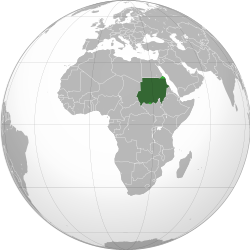202504
美國在剛剛過去的周末宣布,廢除所有已經給予南蘇丹公民的簽證。這是美國川普新政府針對外國所採取的一項前所未見的決定。這項決定由美國國務卿馬可·魯比奧(Marco Rubio)對外宣布。美國國務卿Marco Rubio的中文也可翻譯為馬可·盧比歐(Marco Rubio)。本台法廣非洲組(RFI Afrique)指出,南蘇丹是全球最貧窮國家之一。聯合國官員擔心,南蘇丹重新陷入內戰。
美國廢除所有南蘇丹公民簽證
rfi.fr
美國廢除所有南蘇丹公民簽證
美國在剛剛過去的周末宣布,廢除所有已經給予南蘇
----
南蘇丹共和國(英語:Republic of South Sudan),通稱南蘇丹(英語:South Sudan),是非洲東北部一個內陸國家,2011年從蘇丹獨立。東面是衣索比亞,南面是剛果民主共和國、肯亞和烏干達,西面是中非共和國,北面是蘇丹。包含白尼羅河所形成廣闊的蘇德沼澤。目前首都是第一大城市朱巴,未來計畫將遷都到位置較居中的拉姆塞爾。
現代南蘇丹與蘇丹共和國的領土原為埃及的穆罕默德·阿里王朝佔據,後來成為英埃共管蘇丹,1956年蘇丹共和國獨立後成為其一部分,被劃分為南部10省。第一次蘇丹內戰後,蘇丹南方於1972年至1983年得到自治。第二次蘇丹內戰於1983年爆發,至2005年簽署《全面和平條約》,成立蘇丹南方自治政府。2011年,南蘇丹獨立公投以98.83%通過,南蘇丹共和國於2011年7月9日0時宣告獨立,有30個國家的國家元首或政府代表參加南蘇丹共和國的獨立慶典儀式,聯合國秘書長潘基文也參加了成立儀式。2011年7月14日南蘇丹共和國正式加入聯合國成為聯合國會員國。目前也為非洲聯盟、東非共同體等組織的成員國。2012年7月,簽署了日內瓦公約。
南蘇丹獨立之後仍然有激烈的內部衝突,2014年以後在脆弱國家指數(前身為失敗國家指數)的評分一直是全球最高。該國在2013年至2020年陷入內戰,遭受了猖獗的侵犯人權行為,包括強迫流離失所、種族屠殺和各方殺害記者。不過此後,前交戰各派的領導人薩爾瓦·基爾·馬亞爾迪特和里克·馬查爾達成了團結協議,組建了聯合政府[9],為難民回國鋪平了道路[10]。
南蘇丹人口主要由黑人組成,在人口統計上屬於世界上最年輕的國家,大約有一半不到18歲[11]。大多數居民信奉基督教或各種土著信仰。該國是聯合國會員國[12][13],非洲聯盟[14]、東非共同體、政府間發展管理局[15]成員,以及日內瓦公約的締約國[16]。2019年,南蘇丹在聯合國世界幸福報告中排名倒數第一[17],在全球和平指數上排名倒數第三,在美國和平基金脆弱國家指數上排名第四[18]。
----
202304
As War Rages in Sudan, Countries Angle for Advantage
Even before it went to war last week, “everyone wanted a chunk of Sudan,” an expert said of the strategically located country rich in natural resources.
Republic of the Sudan | |
|---|---|
| Motto: النصر لنا an-Naṣr lanā "Victory is ours" | |
| Anthem: نحن جند الله، جند الوطن Naḥnu jund Allah, jund al-waṭan "We are the soldiers of God, the soldiers of the Nation" | |
 Sudan displayed in dark green color, claimed territories in light green | |
| Capital | Khartoum 15.6°N 32.5°E |
| Largest city | Omdurman |
| Official languages | |
| Ethnic groups | |
| Religion (2020)[4] |
|
| Demonym(s) | Sudanese |
| Government | Federal republic under a military junta[5][6] |
Others[7] | |
| |
| Legislature | Transitional Legislative Council |
| Formation | |
| 2500 BC | |
| 1070 BC | |
| 1885 | |
| 1899 | |
• Independence from the United Kingdom and the Kingdom of Egypt | 1 January 1956 |
• Secession of South Sudan | 9 July 2011 |
| 11 April 2019 | |
• 2019 Draft Constitutional Declaration effective | 20 August 2019 |
| 25 October 2021 | |
| Area | |
• Total | 1,886,068 km2 (728,215 sq mi) (15th) |
| Population | |
• 2022 estimate | 47,958,856[8] (30th) |
• Density | 21.3/km2 (55.2/sq mi) (202nd) |
| GDP (PPP) | 2022 estimate |
• Total | |
• Per capita | |
| GDP (nominal) | 2022 estimate |
• Total | |
• Per capita | |
| Gini (2014) | medium |
| HDI (2021) | |
Chad
The aftermath
Feb 21st 2008 | NDJAMENA
From The Economist print edition
The rebels are gone, but not forgotten
LOOTED and battle-scarred, the shops on Ndjamena's dusty main boulevard remain closed; thousands of Chadians, refugees in neighbouring Cameroon, have yet to return home; and the risk remains of a fresh rebel assault. But for now the message from President Idriss Déby, who on February 14th called a 15-day state of emergency, is clear: he has survived—again—the very type of coup attempt that first brought him to power 18 years ago.
The February 2nd assault on Ndjamena, now known euphemistically as “the events”, caught Mr Déby off-guard. The three main rebel groups, normally so mutually antagonistic, fused into one column and moved in from the east with some 3,000 well-armed men. And, in contrast to their attempt in 2006, this time the rebels, who owed their weaponry to neighbouring Sudan, were organised. They attacked along two main corridors, towards the airport and towards the presidential palace, leaving over 160 killed and hundreds more wounded.
Mr Déby did not survive through his own efforts alone. Fighters from a Darfur rebel group, the Justice and Equality Movement (JEM), came to his aid, hence the number of English-speaking “soldiers” staffing the former French colony's security posts. Meanwhile, the contingent of some 1,100 French troops based in Ndjamena offered just enough logistical and intelligence support to ward off the rebels. As their supplies dwindled, the rebels melted away after just two days.
Yet if the immediate crisis is over, what of its aftermath? The capital's citizens, inured to fighting in Chad's hinterland, remain shocked by the speed with which the rebels reached them. Few risk going out much after dark, even though the curfew begins only at midnight.
The obvious danger for the president is that there will be a next time, and that his luck will run out. A new generation of politicians in Paris is beginning to break with the traditional Françafrique policy of supporting so-called “strong men”. Indeed, though the president might think the French-dominated European Union peacekeeping force now deploying in the east is there to bolster his regime, Brigadier-General Jean-Philippe Ganascia says he is not out to fight for the government: “I won't know who is a rebel, bandit or anything else. As long as somebody is threatening the population, I am ready to use the means I have got.”
Nor is the threat to Mr Déby purely military. The battle for Ndjamena has strained his relationship with the JEM. The group might now regret their move into Chad, as in their absence there was a fresh Sudanese assault on Darfur. Inconveniently, the president's new defence minister, Mahamat Ali Abdallah Nassour, also looks strong. Given that several rebel leaders are former members of Mr Déby's government, the minister's allegiance is far from assured. Meanwhile, Chadians know that ordinary life may get even worse: prices of everything from petrol to mango juice are soaring. For the refugee camps in the east, supply lines to the land-locked country are already under pressure as pre-positioning of food starts ahead of the rainy season. If violence halts the supply effort, there will indeed be a state of emergency for a country harbouring half-a-million refugees and displaced persons.



沒有留言:
張貼留言
注意:只有此網誌的成員可以留言。